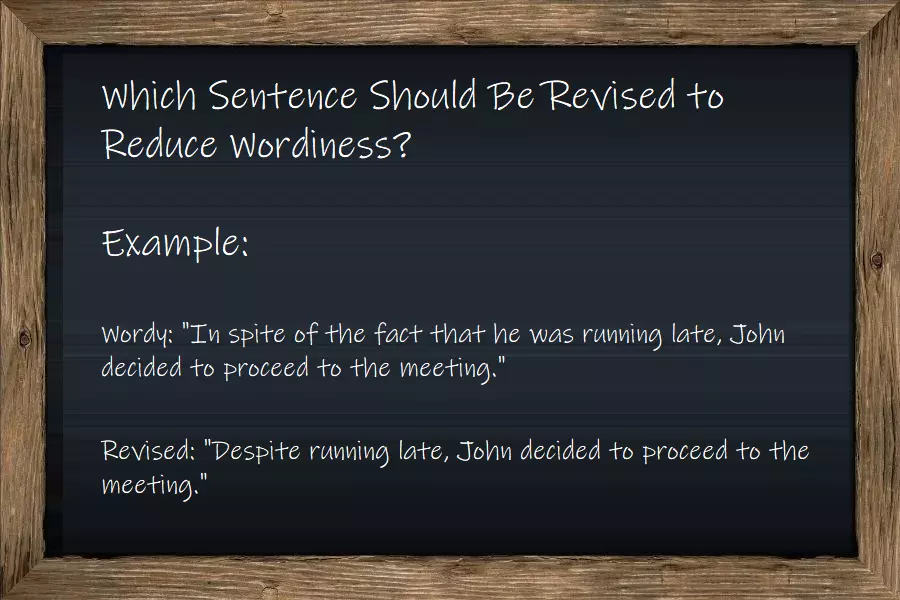In the realm of effective writing, one crucial aspect is brevity. The ability to convey information succinctly is highly valued, as it ensures that the reader can grasp the intended message without any confusion. One common challenge that writers face is wordiness – using more words than necessary to express an idea. In this article, we will explore Which Sentence Should Be Revised to Reduce Wordiness and techniques to identify and revise wordy sentences to enhance the clarity and impact of your writing.
Also Read: Is there a term for a lover of linguistics or a lover of language?
Identifying Wordiness
Wordiness can creep into writing in various forms, such as redundant phrases, unnecessary modifiers, and excessive use of filler words. To identify wordiness in your writing, read your sentences carefully and ask yourself whether each word contributes meaningfully to the message. If any words appear redundant or add little value, consider revising them.
Also Read: Is friend an abstract noun? Ultimate Guide
Why Reduce Wordiness?
Reducing wordiness in your writing offers several benefits. First thing, it enhance the reading experience of your content, making it easy and simple also for the reader to understand your ideas. Secondly, concise writing saves the reader’s time and attention, keeping them engaged. Moreover, concise content is often perceived as more professional and credible.
Also Read: How Many Grams Are in 6.35 Kilograms? Easy Conversion
Techniques to Reduce Wordiness
Eliminate Redundant Phrases
One effective way to reduce wordiness is to eliminate redundant phrases. For example, phrases like “added bonus” or “free gift” can be simplified to “bonus” and “gift,” respectively, without losing their meaning.
Avoid Using Filler Words
Filler words add little substance to your sentences and can be removed without altering the core message. Common filler words include “very,” “really,” “just,” and “actually.” By removing these words, your writing becomes more concise and impactful.
Opt for Active Voice
Using the active voice in your sentences not only reduces wordiness but also enhances clarity. Active voice sentences have a more straightforward structure and are often more engaging to the reader.
Simplify Complex Sentences
Complex sentences with numerous clauses can also be challenging for readers to navigate. Aim to simplify these sentences by breaking them into shorter, more digestible ones.
Remove Unnecessary Modifiers
While descriptive words can enhance your writing, too many modifiers can lead to wordiness. Evaluate whether each modifier is essential and remove any that do not significantly contribute to the sentence.
Benefits of Reducing Wordiness
Reducing wordiness brings numerous benefits to your writing. It enhances clarity, ensuring that your message comes across precisely as intended. Moreover, concise writing is more memorable and impactful, leaving a lasting impression on your readers.
Also Read: How Many Grams in a Kilo: Understanding Metric Measurements
Examples of Revised Sentences
Example 1
Wordy: “In spite of the fact that he was running late, John decided to proceed to the meeting.”
Revised: “Despite running late, John decided to proceed to the meeting.”
Example 2
Wordy: “The restaurant, which is situated on the top floor of the building, offers stunning views of the city skyline.”
Revised: “The restaurant on the top floor offers stunning views of the city skyline.”

Also Read: How Many Ounces is 1/3 Cup – A Simple Conversion Guide
Conclusion
In conclusion, wordiness can hinder the clarity and impact of your writing. By employing various techniques like eliminating redundancies, avoiding filler words, using active voice, simplifying complex sentences, and removing unnecessary modifiers, you can also create more concise and compelling content. Embrace the art of brevity to make your writing shine.
Also Read: 7 Money Rules you didn’t learn in school
Frequently Asked Questions
Q1. Why is wordiness a problem in writing?
A. Wordiness can obscure the intended message and make it challenging for readers to understand the core ideas of the content.
Q2. Can wordiness affect the clarity of a message?
A. Yes, excessive wordiness can also lead to confusion and make it difficult for readers to grasp the main points.
Q3. How can I identify wordiness in my writing?
A. Read your sentences carefully and look for redundant phrases, unnecessary modifiers, and excessive filler words.
Q4. What are some common filler words to avoid?
A. Common filler words to avoid include “very,” “really,” “just,” and “actually.”
Q5. Should I always use the active voice to reduce wordiness?
A. Using the active voice is generally recommended to create more concise and engaging sentences, but passive voice can be appropriate in certain contexts.
Also Read: How Much is 18 Cups in Ounces? The Ultimate Guide
